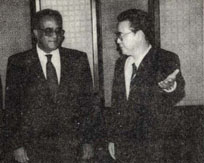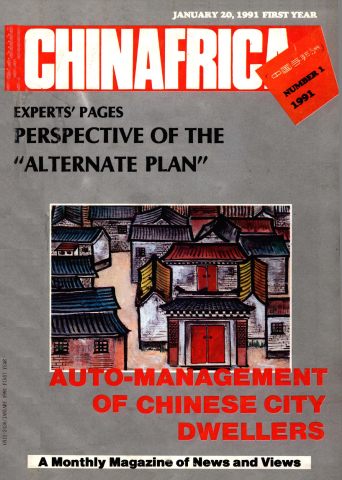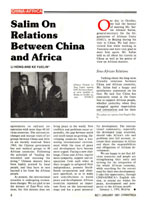One day in October, we had the honour of meeting Mr. Salim Ahmed Salim, general-secretary for the Organization of African Unity(OAU), in Beijing during his visit to China. We had interviewed him while working in Tanzania and were very glad to meet him again. Mr. Salim told us all about his travels in China as well as his points of view on African matters.
Sino-African Relations
Talking about the long-term friendly relations between China and African countries, Mr. Salim had a happy and satisfactory expression on his face. He said that China has constantly stood in the frontline to support African people, whether yesterday when they struggled against imperialism and colonialism and for their national independence, or today when they defend their political independence and develop national economy. China is a large, yet developing country; though not rich itself, it never gave up offering its help to African countries. Today, strengthening Sino-African unity and co-operation is of great importance. It is not only favourable to both China and Africa, but it can also help establish a new international economic order. Sino-African relations have set a good example for south countries to emulate.
Impressions on China
Mr. Salim is an old friend of the Chinese people. He came to China for the first time in 1963 as a young student leader. Six years later, he was appointed Tanzania’s ambassador to China. During his office, he promoted the friendship between his country and China. Later, while serving as Tanzania’s Permanent Representative to the United Nations, he devoted all his energy to the restoration of China’s legitimate seat in the United Nations, gaining the respect of Chinese people. Salim visited China many times. Yet it had been six years since he last came, as leader of a government delegation and as Tanzania’s prime minister. “Each time I visited China, I found new changes,” said Salim. “I witnessed the great achievements of China in implementating reform and opening policies as early as 1984, and this time we see even more evident changes in urban construction, people’s standards of living and their spirit.”
As general-secretary of the OAU, Salim stresses that there are two purposes for this present trip to China. One, to strengthen the friendly cooperative relations between China and Africa, and two, to emphasize once again the importance of closer ties between China, the OAU and its member countries on the international scene. He told us that his talks with Chinese Premier Li Peng, as well as with China’s foreign minister and other high officials had promoted mutual understanding and friendship. China had renewed its promise to support the various efforts of African people in defending their political independence, especially in their economic development and social progress.
Urgent African Matters
Our topic turned to the African continent. He unequivocally told us that one of Africa’s top priority is developing national economies, improving people’s standards of living, eliminating poverty and backwardness, and promoting social progress, all the while building and defending national independence.
Talking about the difficulties of African countries, Salim pointed out that the most urgent and biggest burden facing Africa was the debt problem. At present, the foreign debts of African countries have climbed to US$ 260 billion; so far the accrued interests have exceeded the total loan and other forms of assistance Africa gets every year from Western countries, not to mention the repayment of the principal capitals. The debt burden has become the largest obstacle to the development of an African economy. It has gone beyond the endurance of African countries, and only the creation of anew international economic order can solve this problem.
Unity—Key to Progress
Salim held that the present world economic environment is unfavourable to the development of African countries. He believes that African nations should first establish reliable economic co-operative organizations among themselves, like the African Economic Community, the African Common Market, and others. Unity can only help achieve a much needed development. The progress and development of Africa should depend on African people themselves. Salim criticized the practice of some Westerners who link assistance with the “democratization process.” Suddenly very serious, he pointed out that African people have fought for so long to gain their independence and the right to decide for themselves of their internal affairs. “None of us opposes democracy, nor do we want to quarrel about it with Western countries, but we do not agree at all with the point of view that democracy is the invention of only a few countries and people. Each country should decide its democratization process in accordance with their own interests and cultural traditions. We will never accept any form of assistance provided with political conditions, as it would only infringe on the independence and sovereignty of those aid-recipient countries.
The authors are reporters from People’s Daily.
Chinese Premier Li Peng (right) meeting OAU Secretary General salim (middle) in Beijing on October 23,1990. XINHUA


 Copy Reference
Copy Reference 